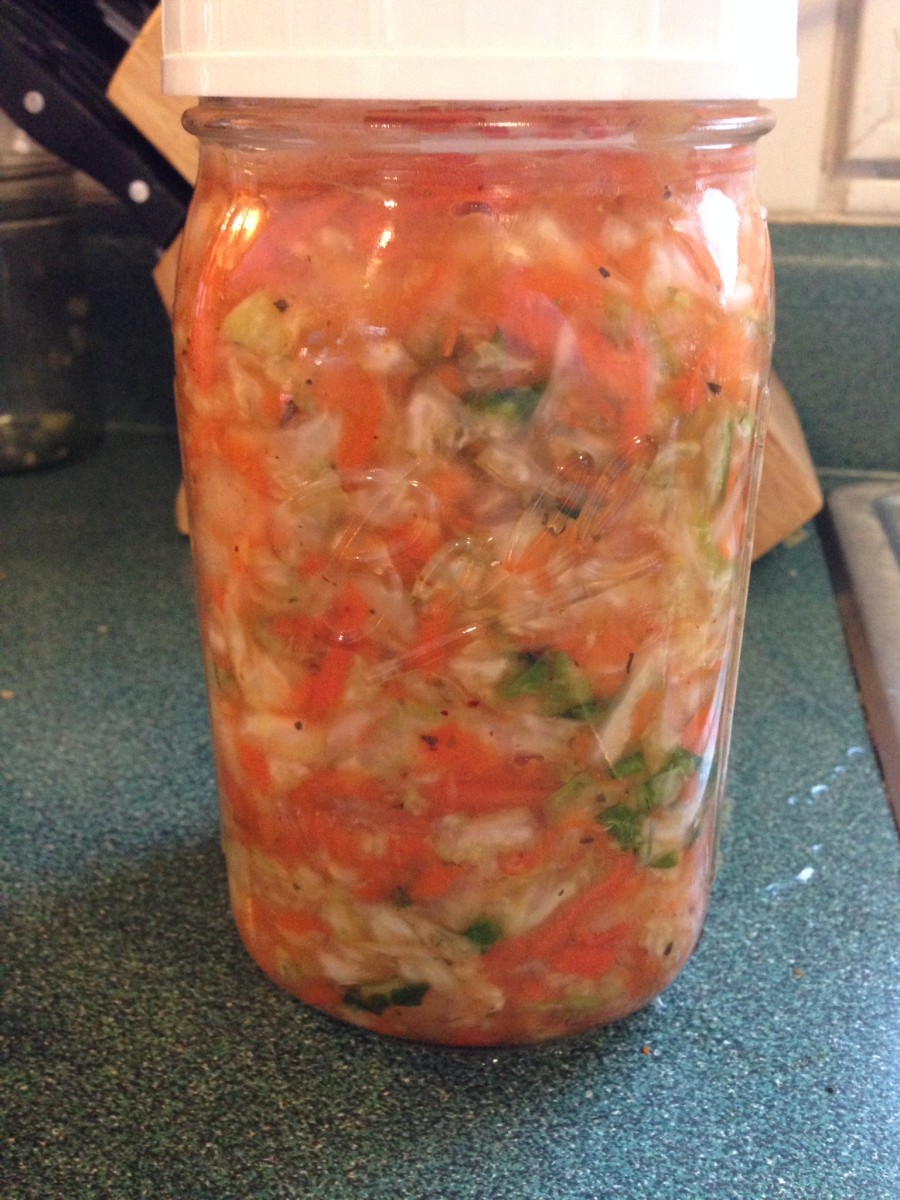Are Fermented Foods a Good Nutritional Choice?
Are Fermented Foods a Good Nutritional Choice?
Would You Be Convinced to Sample a Treat That Has Traces of Bacteria in It?
Well, this does not refer to just any bacteria, but of course, the variety that is safe for consumption. It may sound gross to even entertain the idea of consuming bacteria-laden food when there are just so many regular foods out there. The fact is, it is not uncommon to find an assortment of foods which contains these edible bacteria. Such foods are indeed present in many parts of the world and people actually enjoy eating it.
So, What Is the Real Story Behind This Bacteria Infested Food? Are the Bacteria Present Naturally, or Is It Purposely Added into the Food?

And, Why Would Someone Subject Themselves to Eating Such Food? Is It Safe and What Are the Benefits That Contribute to This Practice?
This leads us to the introduction of the term fermentation - a chemical process whereby molecules such as glucose are broken down anaerobically. We shall examine this subject further in terms of the food processing industry. The scientific term used to describe the fermentation process is known as zymology or zymurgy.
It is referred to as the process of converting carbohydrates to alcohol or organic acids using a combination of bacteria, yeasts, or even microbes to produce what is called fermented foods. This process first started as an ancient technique to preserve food in the olden days.
However, it is still widely practiced these days as a way to produce the many foods that we love like cheese, wine, yogurt and a plethora of other delicious treats. As you may be aware, fermented foods and beverages are becoming more popular nowadays and can be found in many grocery stores and local supermarkets.
What Is the General Idea Behind Fermented Foods?
In layman terms, the bacteria, yeast, and microbes sort of changes the chemical structure of the food by working on its organic compounds. Aside from being able to preserve foods for a longer period, the process of fermentation is an effective means to boost the foods’ bio-nutrient characteristics.
In fact, there are some foods found to be more nutritious in fermented form than otherwise. Fermented foods have indeed been proven to have a diverse list of other benefits that are good for the body.
Improves Digestion
Those experiencing digestive issues would greatly benefit from the consumption of fermented foods. It is because fermented foods are found to contain a component known as probiotics that can help to balance the friendly bacteria in the gut and alleviate digestive problems.
Probiotics are a result of the fermentation process and it aids in reducing the symptoms of irritable bowel syndrome, which affects bowel movements and causes lower abdominal pain. Additionally, fermented foods may also lessen the severity of bloating, diarrhea, and even reduces the effect of constipation.
Promote Anti-Cancer Properties
Cancer is a terrifying disease caused by activation or mutation of abnormal genes in our body.
You May Be Wondering, How Does Consuming Fermented Foods Reduce the Risk of Getting Cancer?
This is how it works – researchers discovered that probiotic cultures in fermented foods decrease the effects of chemical carcinogens that may agitate the cell and cause gene mutations.
It works by detoxifying carcinogens, boosting the production of compounds that inhibit the growth of tumor cells, and most importantly, stimulate the immune system to defend itself against cancer cells, among others.
Several reports around the world prove that fermented foods indeed help to treat certain types of cancer. Studies in the Netherlands and Sweden observed that the regular consumption of fermented dairy products helps reduce the risk of bladder cancer.
Boosts Immune System
Our immune system is crucial and must be in top condition to help us ward off infections and diseases. In our gut, there are bacteria that have a significant impact on our immune system. This bacteria should be balanced in order to keep our immune system in optimal condition.
Fermented foods with high levels of probiotics can help greatly by giving our immune system a boost and promote the growth of gut-friendly bacteria. Should you find yourself down with a cold or recovering from infections, consuming probiotic-rich fermented foods may even help you to recover much faster.
Promotes Heart Health
The consumption of fermented foods has been associated with a lowered risk of contracting heart diseases. Heart diseases are often caused by an unhealthy diet, especially one that is full of fatty varieties. Overindulgence of fatty foods is one of the reasons that can lead a person to an early grave.
However, this frightening repercussions can be minimized or reduced through the consumption of fermented foods. This is because the probiotics in the fermented food modestly reduce blood pressure and help lower ‘bad’ low-density lipoprotein (LDL) cholesterol.
Promote Mental Health
To this day, mental health is a taboo and not openly discussed due to the stigma behind it. However, it is important to recognize that it is an important part of being human.
What are the best fermented foods?
What are the best fermented foods? Vote below
Are You Aware That the Food We Consume Can Also Play a Role in Our Mental Health?
Being aware of it will help us to ensure that we are feeding our body the right foods. It would be ideal to integrate fermented foods as part of our dietary regime as some of them contain the probiotic strains of Lactobacillus helveticus and Bifidobacterium longum, found to reduce the symptoms of anxiety and depression.
Some of you may by now be wondering, what are the types of fermented foods and what exactly is the specific benefit of consuming it? Here are the top five fermented foods.
Yogurt

This cultured dairy product is available in many countries and each has their own twist to this refreshing treat. Yogurt is a milk-based product that is a result of fermentation by bacteria and specific microbes.
Yogurt is basically the by-product of lactic acid fermentation, which gives us other delicious options of food like tempeh, sauerkraut, and beer. Consumption of yogurt aids digestion and the probiotics in yogurt helps keep intestines healthy. Probiotic yogurt is extremely loaded with calcium, zinc, B vitamins, and protein.
Kefir

Kefir is a cultured dairy product as well, but slightly different from yogurt. Kefir has more fat composition and its protein and probiotic contents are definitely higher. Traditionally, kefir is produced by inoculating cow, sheep or goat’s milk with kefir grains.
The kefir grains have a complex microbiological composition with a relatively stable and specific balance of lactic acid, bacteria, and yeast, which ferments the milk to produce kefir. Kefir is a beverage with a slight hint of alcohol, which is widely consumed in Caucasus, Eastern Europe, and Russia. Consuming kefir is known to reduce lactose intolerance, promote better immune system activity, and lower cholesterol.
Kimchi

Kimchi is a fermented vegetable dish from Korea. It is usually made from cabbage but there are also other varieties using radish and cucumber, preserved with garlic and a bunch of spices.
Kimchi contains probiotics, which helps reduce inflammation, tackle digestive issues and improve overall gut health. Being a vegetable-based food, Kimchi contains a high content of vitamins, minerals and dietary fiber, which is good for weight control.
Kombucha

It is a form of fermented tea with a slight alcoholic hint and lightly effervescent. It is made by introducing a symbiotic colony of bacteria and yeast into tea added with sugar. The concoction is left to ferment for a period between one week to a month and the result is a sort of fizzy beverage.
Firstly introduced in China in 221 BC as the ‘Tea of Immortality’, this beverage got its official name Kombucha in Japan in 415 AD. Among the benefits of consuming Kombucha is that it helps reduce blood pressure, improve cholesterol levels and increase the body’s resistance to cancer and detoxifies the body.
Natto

It is a traditional Japanese food that is made from soy, fermented with Bacillus subtilis – a bacterial strain that encourages the production of a unique sticky paste known as ‘strings of natto’ and gives the food its distinct flavor. Due to its texture and smell, natto is said to be an acquired taste.
Natto beans are highly nutritious and provide a string of health benefits, including stronger bones, a healthier heart, and improved immune system. The fermentation of natto is pretty short, which is about 20-22 hours only.








